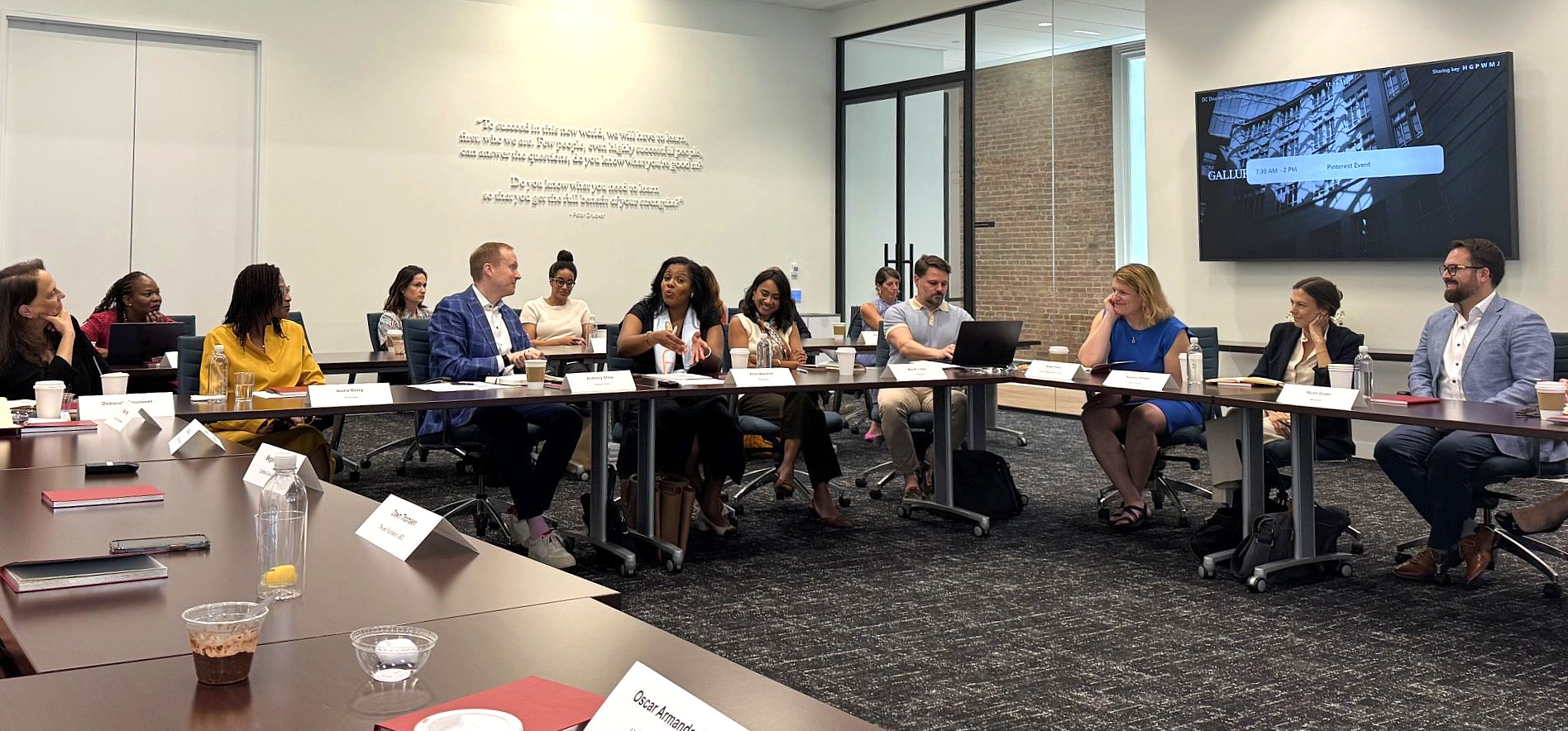Screens, Safety, and Support: Rethinking Youth Mental Health in the Digital Age
The National Digital Roundtable, in partnership with Pinterest, brought together researchers, nonprofit leaders, policymakers, youth advocates, and platform representatives to discuss the intersection of youth mental health and the digital world.

The National Digital Roundtable, in partnership with Pinterest, convened a multidisciplinary group of leaders at Gallup’s headquarters in Washington, D.C. to explore the evolving relationship between youth mental health and the digital environment. This Roundtable built on a 2024 event co-hosted with the American Psychological Association and continued the effort to better understand the opportunities and risks facing young people online.
Participants included researchers, nonprofit executives, policy advocates, youth experts and platform leaders, who gathered to share research, discuss challenges, and identify cross-sector solutions. The convening centered on the question: what does it truly mean to grow up digital—and how can we ensure those experiences support, rather than harm, youth wellbeing?
Key themes from the Roundtable included:
- Platform design influences youth wellbeing. Experts from the Digital Wellness Lab at Boston Children’s Hospital emphasized that platforms themselves are not inherently harmful; outcomes depend on how young people engage with them, and whether they’re designed with safety, privacy, and children’s social emotional development in the first place. Teens who use digital tools to connect, create, or explore their identities tend to report positive effects, while passive use or exposure to harmful content can lead to worse outcomes. (See: Leveraging Interactive Media to Foster Social-Emotional Learning for Youth.)
- Offline support remains critical. The digital world cannot replace real-world relationships. Initiatives like the Youth Mental Health Corps—led by the Schultz Family Foundation and supported by Pinterest—offer peer-based support models that complement online experiences by strengthening social connections and building trust within schools and communities.
- LGBTQ+ youth rely on digital spaces. For many marginalized youth, the internet offers vital spaces for community, identity, and safety—especially in environments where it may not be safe to be out. However, these same youth also face increased exposure to bullying, algorithmic bias, and disinformation.
- AI is reshaping youth experiences—without enough trust. New data from America’s Promise Alliance shows that most young people view AI with skepticism. While some teens use AI tools for creativity and learning, concerns persist about biased chatbots, AI companions, and the emotional toll of overreliance on synthetic relationships–particularly as AI as a whole remains unregulated. International perspectives underscored the need to build developmentally-attuned, culturally aware AI tools for a generation growing up with these technologies.
- Youth voice and agency must remain central. Across discussions, participants called for young people to be treated not just as users, but as co-creators of safer digital spaces. Youth leaders at the convening emphasized developing tools and policies with youth input, supporting inclusive platform design, and expanding digital literacy.
The Roundtable underscored the importance of continued collaboration between public, private, and nonprofit partners to protect and empower young people. Events like this Roundtable remind us that thoughtful design, youth voice, and coordinated action are the cornerstones of a safer digital future.
Roundtable Participants
Organizations represented at the Roundtable included:
- America Forward
- America’s Promise Alliance
- American Psychological Association
- Bedrock
- Berkman Klein Center for Internet & Society at Harvard University
- Born This Way Foundation
- CASEL (Collaborative for Academic, Social, and Emotional Learning)
- Carolina Consulting Prep
- Center for Democracy & Technology
- Common Sense Media
- Digital Wellness Lab at Boston Children’s Hospital
- Equimundo (Formerly Promundo-US)
- Executive Office of the Mayor – DC Government
- Girl Scouts of the USA
- Girls Inc. DC
- Glenstone
- Hispanic Heritage Foundation
- LGBT Tech
- National Center for Missing & Exploited Children
- Plan USA
- R Street Institute
- Safe Online
- Schultz Family Foundation
- Social Driver
- Storytelling for Good
- Surgo Health
- The Jed Foundation (JED)
- The Trevor Project
- Tribus Global Advisors
- United Nations Foundation
- Whitman-Walker Health
- YWCA USA

